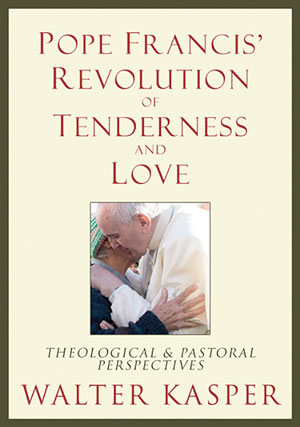Second in a series
Writing this series about Pope Francis and Cardinal Walter Kasper’s book “Pope Francis’ Revolution of Tenderness and Love” (New York: Paulist Press, 2015, pp.117, $16.95), I have become aware that I am reacting toward this pope in a way that I have never reacted to any other pope.
Of course like any Catholic, and especially as a Catholic priest, I have always accepted the teaching of any pope and have tried to promote that teaching in any way that I could. So far I don’t think that Pope Francis has changed any Church teaching, but he has changed the atmosphere in the Church and the image of the Church and the papacy outside of the Church. This is no small accomplishment. He has attracted the interest of both Catholics and others and won the affection of many, myself included.
Reflecting on my own enthusiastic reaction to Pope Francis, I have had difficulty clearly understanding what is different about it in relation to my reaction to other popes. As far back as Pius XII, I have admired every man who led the Catholic Church. Two are canonized saints.
So what is different about my reaction to Pope Francis? Somehow I experience his comments as personally directed to me. I don’t mean that the Holy Father is not reaching many, but his leadership and commitment to the Gospel inspires me just about every time I read or hear about some statement he has made.
Early in his book, Cardinal Kasper notes that he is not going to be dealing with biographical details, anecdotes and stories, and certainly not with gossip about the private details dealing with what really or supposedly is happening behind the Vatican walls.
Indicating what he is trying to do in his small volume, the cardinal writes:
“In the following, the attempt will be made to approach the Francis phenomenon theologically and to illuminate somewhat the theological background and the theological substance of his pontificate, and to make clear the new perspectives that are emerging. The positive as well as the critical assessments are in danger of trivializing or treating the pontificate in a banal manner. If some turn the pope into a kind of rock star, so others regard him as a theological lightweight. Pope Francis is neither the one nor the other…
“The surprisingly new features of this ‘pope of surprises’ are not some innovations, but rather the eternal newness of the gospel, which is always the same and yet, over and over again, is surprisingly new and always relevant in a new way.” (pp. 7, 8)
Concrete Foundation
I think that what drew me to Cardinal Kasper’s book was the opportunity to understand better what is different in Pope Francis’ theology, and what is different in his approach to problems. The cardinal points out that Pope Francis starts not with doctrine or theology, but with the concrete situation. Then he tries to discern what in God’s revelation and in the Church’s teaching might apply and illuminate the concrete situation. He suggests that the Holy Father, after studying a situation, asks himself, “What does God want of me in this situation?”
Cardinal Kasper points out that the great Jesuit theologian Karl Rahner (1904-1984) spoke of an existential knowledge, meaning the knowledge of the concrete will of God that is available to the individual in a given situation. Of course this does not mean that Pope Francis will change God’s revelation or change the Church’s teaching. It means that his starting point is different from his papal predecessors.
I very much like Rahner’s notion of existential knowledge. It seems to me that this is the type of knowledge that each and every one of us should strive for in our lives.
Consoled and Challenged
At this moment in my life, what is God asking of me? What does God want from me at this time in my life? Where is God leading me? God’s love and providential will accompany us every second of our lives. I hope I never forget that. To believe that God is lovingly present every moment should both console and challenge us. That belief can color everything we do. We are never alone.
Cardinal Kasper points out that following the lead of Pope John XXIII the bishops at the Second Vatican Council started with the concrete situation in the world as they tried to read the “signs of the times.” It is quite possible that Pope Francis, like the council, will lead the Church to a new birth that will inspire and instruct not only Catholics but also all persons of good will. That is one of the hopes I have as I observe Pope Francis’ leadership.
Father Robert Lauder, philosophy professor at St. John’s University, Jamaica, is the author of the recently published “Pope Francis’ Spirituality and Our Story” (Resurrection Press).

